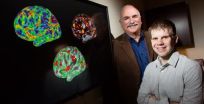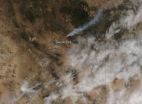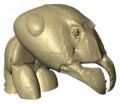(Press-News.org) Nearly half of all adults in the United States suffer from the gum disease periodontitis, and 8.5 percent have a severe form that can raise the risk of heart disease, diabetes, arthritis and pregnancy complications.
University of Pennsylvania researchers have been searching for ways to prevent, half and reverse periodontitis. In a report published in the Journal of Immunology, they describe a promising new target: a component of the immune system called complement. Treating monkeys with a complement inhibitor successfully prevented the inflammation and bone loss that is associated with periodontitis, making this a promising drug for treating humans with the disease.
George Hajishengallis, a professor in the School of Dental Medicine's Department of Microbiology, was the senior author on the paper, collaborating with co-senior author John Lambris, the Dr. Ralph and Sallie Weaver Professor of Research Medicine in the Department of Pathology and Laboratory Medicine in the Perelman School of Medicine. Their collaborators included Tomoki Maekawa, Toshiharu Abe, Evlambia Hajishengallis and Kavita B. Hosur of Penn Dental Medicine and Robert A. DeAngelis and Daniel Ricklin of Penn Medicine.
Earlier work by the Penn team had shown that the periodontal bacterium Porphyromonas gingivalis can hamper the ability of immune cells to clear infection, allowing P. gingivalis and other bacteria to flourish and inflame the gum tissue.
"P. gingivalis has many mechanisms to escape killing by the immune system, but getting rid of inflammation altogether is not good for them because they 'feed' off of it," Hajishengallis said. "So P. gingivalis helps suppress the immune system in a way that creates a hospitable environment for the other bacteria."
The researchers wanted to find out which component of the complement system might be involved in contributing to and maintaining inflammation in the disease. Their experiments focused on the third component of complement, C3, which occupies a central position in signaling cascades that trigger inflammation and activation of the innate immune system.
The team found that mice bred to lack C3 had much less bone loss and inflammation in their gums several weeks after being infected with P. gingivalis compared to normal mice. C3-deficient mice were also protected from periodontitis in two additional models of disease: one in which a silk thread is tied around a tooth, promoting the build-up of microbes, and one in which the disease occurs naturally in aging mice, mimicking how the disease crops up in aging humans.
"Without the involvement of a different complement component, the C5a receptor, P. gingivalis can't colonize the gums," Hajishengallis said. "But without C3, the disease can't be sustained over the long term."
Building on this finding, the researchers tested a human drug that blocks C3 to see if they could reduce the signs of periodontal disease in monkeys, which, unlike mice, are responsive to the human drug. They found that the C3 inhibitor, a drug called Cp40 that was development for the treatment of the rare blood disease PNH and ABO-incompatible kidney transplantation, reduced inflammation and significantly protected the monkeys from bone loss.
"We think this drug offers a promising possibility for treating adults with periodontitis," Lambris said. "Blocking C3 locally in the mouth helps shift the balance of bacteria, producing an overall beneficial effect."
According to the researchers, this study represents the first time, to their knowledge, that anyone has demonstrated the involvement of complement in inflammatory bone loss in non-human primates, setting the stage for translation to human treatments.
The results, Hajishengallis said, "provide proof-of-concept that complement-targeted therapies can interfere with disease-promoting mechanisms."
INFORMATION:
The research was supported by the National Institutes of Health, the European Commission and the University of Pennsylvania Institute for Translational Medicine and Therapeutics.
Penn team identifies promising new target for gum disease treatment
2014-05-20
ELSE PRESS RELEASES FROM THIS DATE:
A full serving of protein at each meal needed for maximum muscle health
2014-05-20
Most Americans eat a diet that consists of little to no protein for breakfast, a bit of protein at lunch and an overabundance of protein at dinner. As long as they get their recommended dietary allowance of about 60 grams, it's all good, right?
Not according to new research from a team of scientists led by muscle metabolism expert Doug Paddon-Jones of the University of Texas Medical Branch at Galveston. This research shows that the typical cereal or carbohydrate-dominated breakfast, a sandwich or salad at lunch and overly large serving of meat/protein for dinner may not ...
Cognitive test can differentiate between Alzheimer's and normal aging
2014-05-20
CHAMPAIGN, Ill. — Researchers have developed a new cognitive test that can better determine whether memory impairments are due to very mild Alzheimer's disease or the normal aging process.
Their study appears in the journal Neuropsychologia.
The Alzheimer's Association estimates that the number of Americans living with Alzheimer's disease will increase from 5 million in 2014 to as many as 16 million by 2050. Memory impairments and other early symptoms of Alzheimer's are often difficult to differentiate from the effects of normal aging, making it hard for doctors to ...
School-based interventions could benefit children from military families
2014-05-20
COLUMBIA, Mo. – Nearly 2 million children in the United States have experienced a parent's military deployment. Previous research has shown that these children may be at increased risk for emotional, behavioral and relationship difficulties, yet little is known about how best to address military children's specialized needs. Now, an MU researcher says school-based interventions could benefit children whose parents have deployed.
David Albright, an assistant professor at the MU School of Social Work, says military children are an overlooked population in need ...
Unlocking the potential of bacterial gene clusters to discover new antibiotics
2014-05-20
Resistance to antibiotics has been steadily rising, posing a threat to public health. Now, a method from Mohammad Seyedsayamdost, an assistant professor of chemistry at Princeton University, may open the door to the discovery of a host of potential drug candidates.
The vast majority of anti-infectives on the market today are bacterial natural products, made by biosynthetic gene clusters. Genome sequencing of bacteria has revealed that these active gene clusters are outnumbered approximately ten times by so-called silent gene clusters.
"Turning these clusters on would ...
Receptive to music
2014-05-20
This news release is available in German. Music can be soothing or stirring, it can make us dance or make us sad. Blood pressure, heartbeat, respiration and even body temperature – music affects the body in a variety of ways. It triggers especially powerful physical reactions in pregnant women. Scientists at the Max Planck Institute for Human Cognitive and Brain Sciences in Leipzig have discovered that pregnant women compared to their non-pregnant counterparts rate music as more intensely pleasant and unpleasant, associated with greater changes in blood pressure. Music ...
Update for Skunk Fire, Arizona
2014-05-20
The Skunk Fire which began as a lightning strike on Saturday, April 19 is currently 31,167 acres large including fire growth and back burns.The fire continues to move in a north westerly direction and an easterly direction towards ponderosa pine forest. South and North side of the fire is contained. The terrain for this fire is steep with scattered boulders making firefighting more difficult. The entire fire is currently 44% contained and full containment is expected by Friday, May 23, according to Inciweb.org.
The National Weather Service has forecast maximum temperatures ...
Boosting Immune process with IFN-γ helps clear lethal bacteria in cystic fibrosis
2014-05-20
Boosting a key immune process called autophagy with interferon gamma (IFN-γ) could help clear a lethal bacterial infection in cystic fibrosis, a new study suggests. The work, led by a team in The Research Institute at Nationwide Children's Hospital and published in PLoS One in May, offers new information about immune function in patients with the disease.
Cystic fibrosis, CF for short, is caused by a malfunction in the CFTR gene, which is responsible for transporting chloride and water across cell membranes. In people with the disease, cells that line the passageways ...
Scientists study biomechanics behind amazing ant strength
2014-05-20
A recent study into the biomechanics of the necks of ants – a common insect that can amazingly lift objects many times heavier than its own body – might unlock one of nature's little mysteries and, quite possibly, open the door to advancements in robotic engineering.
A small group of engineers at The Ohio State University combined laboratory testing and computational modeling conducted at the Ohio Supercomputer Center to determine the relationship between the mechanical function, structural design and material properties of the Allegheny mound ant (Formica exsectoides). ...
New lithium battery created in Japan
2014-05-20
WASHINGTON D.C., May 20, 2014 -- The long life of lithium ion batteries makes them the rechargeable of choice for everything from implantable medical devices to wearable consumer electronics. But lithium ion batteries rely on liquid chemistries involving lithium salts dissolved in organic solvents, creating flame risks that would be avoided if the cells were completely solid-state.
Now a team of researchers at Tohoku University in Japan has created a new type of lithium ion conductor for future batteries that could be the basis for a whole new generation of solid-state ...
Reading privacy policy lowers trust
2014-05-20
Website privacy policies are almost obligatory for many online services, but for anyone who reads these often unwieldy documents, trust in the provider is more commonly reduced than gained, according to US researchers.
Almost every commercial website, social network, search engine and banking site has a privacy policy. Indeed, these and countless other sites that scrape personal information via forms, logins and tracking cookies are obliged by law in some parts of the world to post a document online giving details of how they protect any personal data you give the site ...





